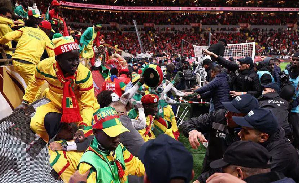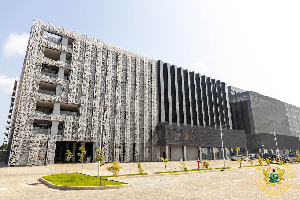OF PETROLEUM UPSTREAM ACTIVITIES
By Clara Kasser-Tee, Legal Practitioner
Introduction:
The news of the discovery of oil in commercial quantities in Ghana was, as expected, greeted with shouts of joy. The joy promises to be felt for a long time as government begins to assure the citizens the black gold would be properly managed to prop up the economy in the best interest of all. Yet, there are fears the precious gift could become a curse rather than the blessing it is intended to bring Ghanaians and all who come to deserve a part of the cake. Among the major concerns is the almost unavoidable attendant environmental pollution and its consequent devastating effects. This worry is legitimate given the recent ruinous results from the Gulf of Mexico spillage and the pathetic and heart wrenching findings on the effect and state of pollution in Nigeria’s Ogoniland. News of these and other pollution has only made us as Ghanaians fear for our environment and the livelihoods of our fishermen in the Western Region.
This fear has been worsened by the perception that our existing laws do not afford adequate protection against environmental pollution. While efforts at enacting a comprehensive environmental regime for Ghana are welcome, it must be noted that with regards to petroleum upstream activities our existing laws do afford adequate protection for both personnel and the environment. This protection can be found in section 3 of the Petroleum Exploration and Production law, 1984 (PNDCL 84) (the “PEPL”). If interpreted carefully and enforced diligently it will prove the best protection for personnel and the environment that any country can ever have. This brilliant section 3 is usually further fortified in Petroluem Agreements entered into by the Republic. The question, however, is whether the full ambit of section 3 of the PEPL (hereinafter referred to simply as section 3) is enforced. In this article I shall explain briefly the nature of petroleum upstream activities, and how section 3 fits in.
Petroleum upstream Activities
Petroleum upstream activities have to do with exploration, development and production. These include the searching for potential underwater oil and gas fields, drilling of exploratory wells, and subsequently operating wells that recover and bring the crude oil and/or raw natural gas to the surface. Sophisticated technology and plant are used in these activities. The quality standards of these plants or technology, the competence of the handlers, and observance of required procedure could protect the lives of personnel and environment, or endanger the life of personnel and pollute the environment. So health, safety and environmental (“HSE”) rules and procedures cannot be overemphasized.
Ghana does not have a comprehensive HSE policy . There are however several provisions on health, safety and the environment scattered in different pieces of legislation including the Fisheries Act, the EPA Act and Regulations, the Oil in Navigable Waters Act, and the Factories Act. These provisions on their own are inadequate. However, section 3 by itself would afford sufficient protection for the lives of our compatriots and others in employment and our environment, if we would totally enforce it.
Section 3
Section 3 of the PEPL states as follows:
“Any operations undertaken under a petroleum agreement or other authority granted under this Law shal1 be carried out in accordance with such Regulations as may be prescribed and with the best international practices in comparable circumstances relating to exploration and production of petroleum, including secondary recovery and the prevention of and waste of petro1eum, so as to maximize the ultimate recovery of petroleum from a petroleum field. Such practices sha11 include all reasonable steps to secure the safety, health and welfare of persons engaged in these operations and shall be in accordance with any directions given, restrictions imposed or requirements made by the Secretary to ensure compliance with such Regulations as may be prescribed.”
In simple terms section 3 means that Contractors engaged in petroleum exploration and production are to carry out their activities in accordance with any prescribed Regulations; and international best practices. The ambit of this section extends to maximizing the ultimate recovery of petroleum from a petroleum field, and health, safety and welfare of personnel. These must at all times be in accordance with any prescribed Regulations and the best international practices at the time. There are no prescribed Regulations to the PEPL yet. But there are definitely ‘best international practices’.
The effect of section 3 thus is that when the activities of a petroleum Contractor result in harm to personnel or the environment, there are two questions to ask before holding the Contractor accountable or otherwise. These questions must be:
1. Did the Contractor comply with the HSE provisions in the various scattered laws; and
2. Did the Contractor comply with the best international practice in such area?
A negative response to any of these questions means the Contractor is in contravention of section 3.
Often, the provisions in our scattered legislation do not provide adequately for spills, and the health and safety of personnel. Where such provision is made the penalties may be fines of negligible amounts in comparison to the gains made by these Contractors. However, section 3 allows us to resort to best international practices where our own pieces of legislation are inadequate.
How can section 3 be enforced?
Section 3 can be enforced by making Regulations for upstream petroleum activities, and compiling what the ‘best international practices’ are with regards to the various activities at any time. The provisions of these Regulations to be passed by the Ministry of Energy must not only cover the issues in section 32 of the PEPL, but must also reflect Ghana’s comprehensive HSE policy. It is a shame that even though the PEPL was passed in 1984, the Regulations pursuant to this law are yet to be made.
The first step towards enforcing section 3 should be setting out what the ‘best international practices’ are at a given time. This can be done by the GNPC and the Contractors. The best practices would include sanctions for non-compliance. And this can be done by thorough research and compilation of the findings. Once this is done Contractors know for certain what the agreed best practices are with regards to exploration and production, and what they are expected to comply with at a given time. The cost of this research and the compilation of the report should be included as ‘Cost’ under the Petroleum Agreements .
After compiling the best international practices, the Minister of Energy must then proceed to pass Regulations in accordance with section 32 of the PEPL. These Regulations should focus on our own local concerns and HSE policies which may not have been captured by the ‘best international practices’.
Assuming that upon compiling the best international practices, and passing the prescribed Regulations, there arises a novel difficulty or ‘lacuna’ at any given time, section 3 again comes to the rescue. The section allows the Minister for Energy to issue directions and/or impose restrictions or other requirements to ensure compliance with the Regulations.
The third ambit towards enforcing section 3 should be dedicated, rigourous and diligent monitoring and evaluating the performance of Contractors vis a vis the agreed best international practices, the Regulations and any directives or restrictions that may be imposed at any given time. It includes a regular and systematic review of the best practices and the issuance of any needed directives at a given time.
Financing the Cost
Surely, we want to invest in our future and in the protection of our environment and the safety and livelihoods of our compatriots. This we can do by enforcing section 3, and at a minimal cost. As indicated above the costs of compiling the best international practices should be borne by GNPC and the Contractors, and may be included as allowable costs under the Petroleum Agreements. As to the cost needed for the necessary consultation and research for the purposes of making the prescribed Regulations, we could look to the Petroleum Revenue Fund. It takes not only political will, but dedication on the part of the officers to do the research, monitoring and evaluation. This done, we would be on a sound footing to protecting our personnel and our environment with regards to upstream petroleum activities . Section 3 by itself offers sufficient legal protection for our environment and personnel with regards to petroleum upstream activities. The problem is that we have not enforced the full ambit of the gracious section
3.
Conclusion
We do not need to rewrite our petroleum agreements. All our petroleum agreements provide for compliance with section 3 of the PEPL. So there will be no questions of retroactive legislation, with regards to enforcing section 3 at any given time. Thus, once again the point is to be made that our problem is not that we do not have beautiful laws. Our problem is that we do not fully enforce the laws that we have. It is only when we fully enforce the existing laws, and are still unable to give the protection we need that we should spend time, energy and resources enacting new laws. This is because laws no matter how beautiful and accurate are useless if they will not be enforced.
I will be thrilled to read your comments or suggestions.
Please send to ckbtee@ gmail.com.
Opinions of Thursday, 8 September 2011
Columnist: Kasser-Tee, Clara














